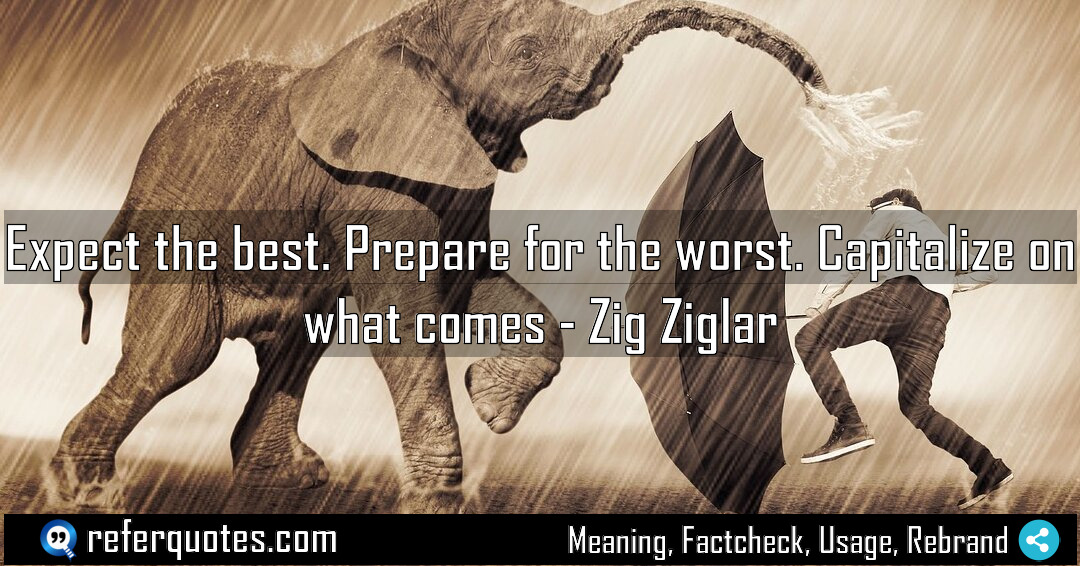Expect the best. Prepare for the worst is a powerful three-part formula for navigating life’s uncertainties. It’s not just positive thinking; it’s a strategic approach that combines optimism with action. This mindset allows you to stay hopeful while being ready to handle any outcome, turning challenges into opportunities for growth.
Share Image Quote:Table of Contents
Meaning
At its core, this quote is a three-part operating system for life. It’s about holding a positive vision while simultaneously building a fortress of preparedness, all so you’re agile enough to seize the moment, no matter what it brings.
Explanation
Let’s break this down, because most people get the first two parts but miss the magic of the third. “Expect the best” sets your internal GPS. It’s your attitude. Your energy. It’s what gets you out of bed in the morning believing that good things are possible. But here’s the thing—if you stop there, you’re just an optimist, and let’s be honest, the world can be tough on pure optimists.
That’s where “Prepare for the worst” comes in. This is your strategy. It’s the work. It’s doing the risk assessments, having the savings account, running the drills. This isn’t about being pessimistic; it’s about being pragmatic. It’s the grit that backs up your grin.
But the real secret sauce, the part that most people forget, is “Capitalize on what comes.” This is where the real pros live. This is agility. It’s the ability to pivot, to adapt, to take whatever the universe throws at you—the good, the bad, the ugly—and find a way to use it. A door slams shut? You capitalize on the new view from the window that just opened. It’s the ultimate power move.
Quote Summary
| Context | Attributes |
|---|---|
| Original Language | English (3668) |
| Category | Personal Development (697) |
| Topics | adaptability (22), optimism (9), resilience (106) |
| Literary Style | balanced (59), memorable (234) |
| Emotion / Mood | lively (108), realistic (354) |
| Overall Quote Score | 80 (256) |
Origin & Factcheck
This one comes straight from the legendary motivational speaker Zig Ziglar. It’s from his mega-bestseller “See You at the Top,” which was first published way back in 1975 in the United States. You’ll sometimes see similar sentiments floating around, but this specific, powerful three-part structure is pure Ziglar.
Attribution Summary
| Context | Attributes |
|---|---|
| Author | Zig Ziglar (36) |
| Source Type | Book (4032) |
| Source/Book Name | See You at the Top (29) |
| Origin Timeperiod | Modern (530) |
| Original Language | English (3668) |
| Authenticity | Verified (4032) |
Author Bio
Zig Ziglar inspired generations with his upbeat, practical lessons on sales and success. He started in door-to-door cookware sales, rose to corporate leadership, and then founded Ziglar, Inc. to train leaders worldwide. His books—like See You at the Top and Secrets of Closing the Sale—blend ethics, optimism, and actionable steps. He spoke to millions across the globe and built a lasting legacy in personal development and professional selling. If you’re exploring his writings, check the
| Official Website | Facebook | X| Instagram | YouTube
Where is this quotation located?
| Quotation | Expect the best. Prepare for the worst. Capitalize on what comes |
| Book Details | Publication Year/Date: 1975; ISBN/Unique Identifier: 978-0-88207-957-2; Last edition: Revised & Updated, Pelican Publishing 2010; Number of pages: 416 |
| Where is it? | Chapter 8: Mastering the Climb, Approximate page 300 from 2010 edition |
